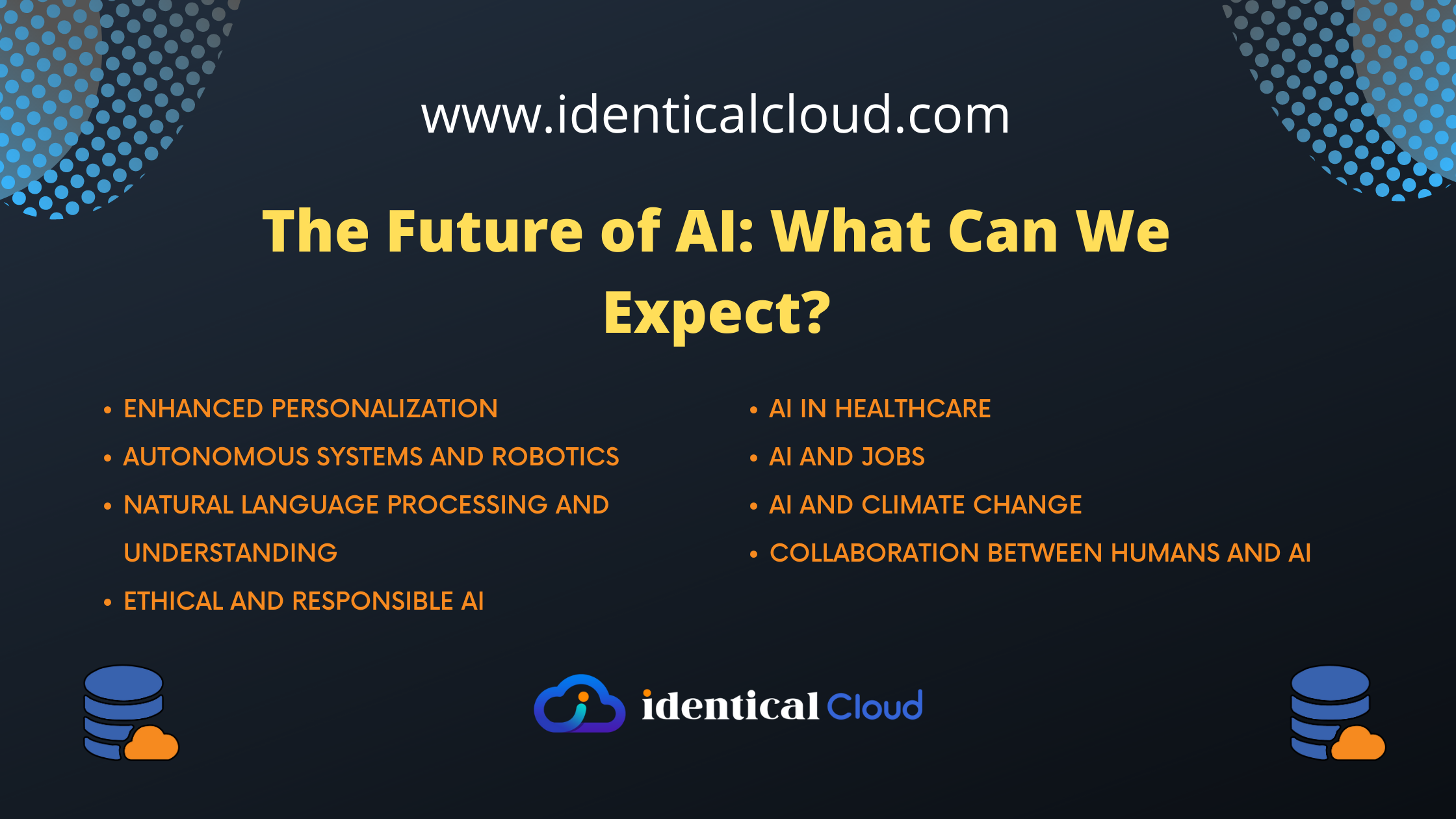
The Future of AI: What Can We Expect?
The Future of AI: What Can We Expect?
Artificial Intelligence (AI) has rapidly evolved in recent years, transforming various aspects of our lives and revolutionizing industries. From voice assistants in our smartphones to self-driving cars and personalized recommendations on streaming platforms, AI has become an integral part of our daily experiences. But what does the future hold for AI?
In this blog post, we will explore the exciting possibilities and potential challenges that lie ahead as AI continues to advance.
- Enhanced Personalization:
One area where AI will continue to flourish is in personalized experiences. As AI systems gather more data and refine their algorithms, they will become even better at understanding individual preferences, behaviors, and needs. This will result in highly tailored recommendations, curated content, and personalized services across various domains such as entertainment, e-commerce, healthcare, and education. AI-powered virtual assistants will become more intuitive and capable, anticipating our needs and providing proactive support. - Autonomous Systems and Robotics:
Advancements in AI will drive the development of autonomous systems and robotics. We can expect to see further progress in self-driving cars, drones, and robotic assistants. These technologies will not only make our lives more convenient but also have the potential to improve safety, efficiency, and productivity in industries such as transportation, logistics, healthcare, and manufacturing. From automated warehouses to robotic surgery, AI-powered machines will take on increasingly complex tasks, freeing humans to focus on higher-level responsibilities. - Natural Language Processing and Understanding:
AI’s ability to understand and process natural language will continue to improve. Conversational AI, including chatbots and virtual assistants, will become more sophisticated, offering more human-like interactions. Natural language processing (NLP) will enable AI systems to comprehend and generate text, making advancements in areas such as language translation, content generation, customer support, and information retrieval. We can anticipate more seamless and intuitive communication with AI-powered interfaces. - Ethical and Responsible AI:
As AI becomes more pervasive, the need for ethical and responsible AI practices will grow. There will be an increased focus on ensuring transparency, fairness, and accountability in AI systems. Efforts will be made to address biases, enhance privacy protections, and establish regulations around AI usage. AI ethics will become a critical consideration in the development and deployment of AI technology, with a focus on minimizing harm, promoting inclusivity, and fostering trust between humans and AI systems. - AI in Healthcare:
AI has the potential to revolutionize healthcare by enabling more accurate diagnoses, personalized treatment plans, and improved patient care. Machine learning algorithms can analyze vast amounts of medical data, assisting doctors in identifying patterns, predicting outcomes, and recommending the most effective interventions. AI-powered tools can also enhance medical imaging, drug discovery, and remote monitoring, bringing healthcare services to underserved areas and improving overall health outcomes. - AI and Jobs:
The impact of AI on jobs will continue to be a topic of discussion. While AI may automate certain tasks, it is also expected to create new job opportunities. The demand for AI specialists, data scientists, machine learning engineers, and AI ethicists will continue to rise. Additionally, AI will augment human capabilities, enabling workers to focus on tasks that require creativity, critical thinking, and emotional intelligence. Lifelong learning and upskilling will be essential for individuals to adapt to the changing job landscape. - AI and Climate Change:
AI can play a significant role in addressing climate change and sustainability challenges. From optimizing energy consumption to improving agricultural practices and monitoring environmental changes, AI can contribute to mitigating the impact of human activities on the planet. AI-driven solutions can help optimize resource allocation, enable smart grids, and support the development of clean energy technologies. - Collaboration between Humans and AI:
The future of AI lies in collaboration between humans and machines. Rather than replacing humans, AI will augment human capabilities and provide support in decision-making processes. Human-AI partnerships will become more prevalent in areas such as creativity, research, and problem-solving. By leveraging the strengths of both humans and AI, we can achieve remarkable breakthroughs and advancements across various domains.
The future of AI holds tremendous potential for innovation, personalization, and societal transformation. While there are challenges to address, such as ethics, job displacement, and privacy concerns, the continued development and responsible deployment of AI technology can bring significant benefits to individuals and society as a whole. By embracing the possibilities and proactively shaping the future of AI, we can harness its power to create a more connected, intelligent, and sustainable world.
